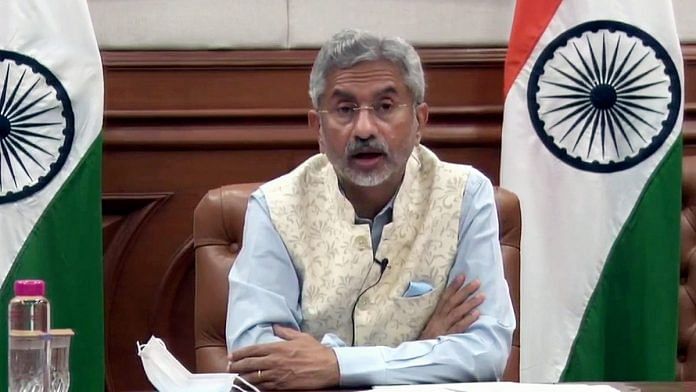New Delhi: External Affairs Minister S. Jaishankar Saturday emphasised the need to respect Afghanistan’s “national sovereignty and territorial integrity” as he made an address on the first day of historic intra-Afghan peace talks between Kabul and the Taliban.
Addressed the conference on Afghan peace negotiations at Doha today. Conveyed that the peace process must:
• Be Afghan-led, Afghan-owned and Afghan-controlled
• Respect national sovereignty and territorial integrity of Afghanistan
• Promote human rights and democracy pic.twitter.com/wFG3E2OVlJ
— Dr. S. Jaishankar (@DrSJaishankar) September 12, 2020
Stressing India’s long-standing stance of not engaging directly with the Taliban, Jaishankar reiterated Saturday that the peace process should be Afghan-owned and Afghan-led.
Jaishankar attended the talks, which are being held in Qatar, via video-conferencing. India was represented in Doha by J.P. Singh, Joint Secretary (Pakistan, Afghanistan and Iran), Ministry of External Affairs.
The long-awaited intra-Aghan dialogue is aimed at establishing a power-sharing deal that will help end decades of war in the country, which continues to be wracked by terrorist violence, including against minorities.
In his address at the talks, Jaishankar said the peace dialogue between the Ashraf Ghani government and the Taliban should also ensure the interest of minorities, women and the vulnerable, and effectively address “violence across the country.”
“The friendship of our peoples is a testimony to our history with Afghanistan. No part of Afghanistan is untouched by our 400-plus development projects. (We are) confident that this civilisational relationship will continue to grow,” he said.
Also Read: Pakistan invites Taliban, China to discuss Afghanistan peace talks aimed at ending 19-yr war
Pakistan opposed invitation to India
India was invited to the event by the Qatari government on the recommendation of the Afghan government.
Some of the other countries that participated in the opening of the intra-Afghan dialogue are Iran, Japan, France, Germany, Saudi Arabia, Sweden, UAE, Turkey. The US, China, Pakistan and Russia, which were instrumental in the peace deal signed between Washington and the Taliban earlier this year, were present as well. The peace talks between the Taliban and the US, which has been fighting a war in Afghanistan for two decades, didn’t involve the Afghan government, at the former’s instance.
Islamabad had raised objections with Qatar for inviting New Delhi, but they were turned down by both Doha as well as Kabul, Indian diplomatic sources told ThePrint.
While India was never a party to the US-led peace talks with the Taliban, New Delhi was kept abreast of the developments there by both the Ghani government as well as Washington, much to Islamabad’s chagrin.
The Donald Trump administration has maintained that India continues to be an important player in the US’ talks with the Taliban. This is one of the reasons why the US Special Representative for Afghanistan Reconciliation, Zalmay Khalilzad, made a hurricane trip to India in May at the peak of the Covid-19 pandemic and the ensuing lockdown.
Also Read: Long-delayed Afghan-Taliban peace talks to start on Saturday
Violence continues in Afghanistan
In February this year, the US and Taliban signed a peace deal, and Washington and its NATO partners vowed to withdraw their troops from Afghanistan, signalling an end to the 18 years of war there.
Since then, the Ghani government has been struggling to launch the intra-Afghan dialogue as the next step in the peace deal, under which it will negotiate with the Taliban and discuss the future of Afghanistan after the complete withdrawal of foreign troops from the country.
However, India is concerned that, by bringing the Taliban back to power, Afghanistan will once again be subjected to massive violence.
India has been contributing to and aiding the development of the country since the beginning of the war there. New Delhi has also been concerned over the attacks there on Afghan Hindus and Sikhs.
In March this year, the ISIS attacked a gurdwara in Kabul, killing 25 Sikhs and injuring many.
Earlier this week, Afghanistan Vice-President Amrullah Saleh escaped a bomb attack that killed two civilians and injured many. The Taliban denied responsibility for the attack.
“We are certain that peace between the Islamic Republic of Afghanistan and the Taliban Movement will strengthen national unity for the purpose of durable stability and can increase the power and means of the country’s defence and security forces against domestic and external threats,” said Abdullah Abdullah, head of the Afghan government’s delegation at the peace talks in Qatar.
Also Read: US-Taliban peace talks won’t go far without India. Modi should explore Afghan opportunities



